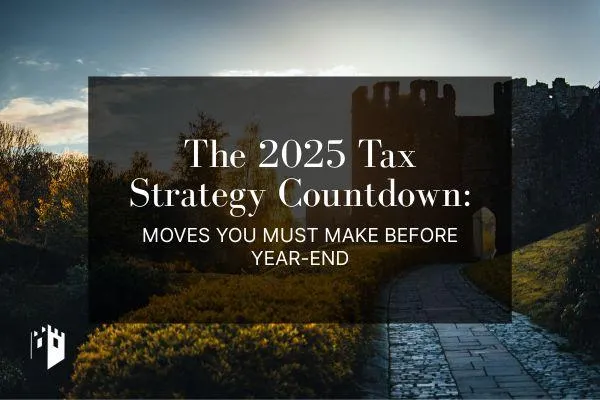
The 2025 Tax Strategy Countdown: Moves You Must Make Before Year-End
The Opportunity Built by Business Act (OBBBA) is now law. For investors, fund managers, syndicators, and business owners, this bill is not noise in Washington. It is a new set of tools that either put money back in your pocket or leave it on the table.
Most CPAs will not connect the dots for you. They will wait until filing season, plug numbers into tax software, and tell you what you owe. By then, it is too late. The real savings happen now, in September and October.
Here are the strategies you still have time to execute before December 31 — if you have the right partner guiding you.
1. Accelerated Depreciation Under the OBBBA
The OBBBA restored 100 percent bonus depreciation, permanently. That means when you acquire qualifying property this year, you expense it in year one instead of waiting decades.
For real estate investors, the practical move is commissioning a cost segregation study. It breaks down a purchase into components, often shifting 20 to 30 percent into immediate deductions.
For syndication investors, this often shows up as a large paper loss on your K-1. The question is whether your overall tax position allows you to use it. That is where strategy, not software, matters.
2. Opportunity Zones with No Expiration
The bill made Opportunity Zones permanent, with a new map of designations every ten years. The benefits are unique in the entire code:
Defer capital gains by reinvesting into a qualified fund
Reduce the gain itself with a basis step-up of 10 to 30 percent, depending on the zone.
Eliminate tax entirely on new appreciation if you hold for ten years.
If you have a major liquidity event this year — a business sale, a stock liquidation, or a real estate exit — you have six months to move the gain. If your advisor has not raised this with you, that should tell you everything.
3. Estate and Wealth Transfer Planning
The OBBBA locked in the estate tax exemption at $15 million per person, $30 million per couple. Anything above that is taxed at 40 percent.
This is certainty we have not had in years. You now know the threshold will not sunset. If you are building toward those numbers, there is no excuse for waiting. Dynasty trusts, family partnerships, and charitable structures can be set in motion before December 31. After that, opportunities narrow.
4. Pass-Through Entity Tax (PTET) Optimization
The bill preserved the state-level PTET workarounds that allow S-corps and partnerships to deduct state taxes at the entity level. This turns what was once capped at $10,000 into a business deduction passed through on your K-1.
If your CPA has not reviewed whether your entity elections are structured to capture PTET benefits in high-tax states, you are leaving money on the table.
5. Qualified Small Business Stock (QSBS) Improvements
The OBBBA expanded QSBS rules. Hold C-Corp stock for three years and you may exclude 50 percent of the gain. Four years earns 75 percent. Five years or more is still 100 percent.
If you are seeding or exiting private companies, this should be central to your planning. Timing matters. The difference between selling in year four versus year five is the difference between paying tax on three-quarters of your gain or none at all.
6. Passive Loss Planning Under the New Rules
The excess business loss limitation remains, which means large depreciation deductions may not offset all your other income in year one. The nuance here is planning across your portfolio.
Pair passive depreciation from real estate with passive income from other funds.
Use grouping elections strategically if you or your spouse qualify as a Real Estate Professional.
Position short-term rental activity correctly, where the rules diverge from traditional real estate.
The “plug and play” CPA misses this. A strategic advisor aligns your portfolio so every dollar of loss is absorbed.
7. The Timing Window Is Short
By November, most of these moves will be out of reach. Cost seg studies take time. Estate structures require attorneys. Opportunity Zone funds have deadlines.
The IRS is not going to extend these dates for you. The choice is simple. Act now, or file in April and watch the opportunities you missed.
Why This Matters Now
You do not need another CPA who files returns. You need a partner who builds a tax battle plan, coordinates with your attorneys and advisors, and makes sure every strategy is executed on time.
That is what we do at Stonehan. If you are serious about reducing your 2025 tax bill and preparing for the OBBBA environment, the window is open — but not for long.
